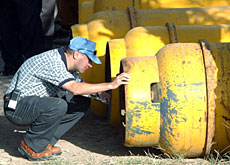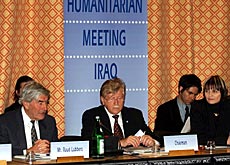Swiss stick to policies of the Gulf War

The looming war against Iraq is already testing Swiss neutrality, with the US demanding to use Swiss airspace.
The government made clear its position on Friday – one that echoes the policy of the Gulf War, which proved a watershed for Swiss foreign policy.
The Gulf War, precipitated by Iraq’s invasion of Kuwait, forced Switzerland to adapt its neutrality to a new world order. It was the first time Switzerland adopted UN sanctions in their entirety.
As the first international conflict since the end of the Cold War, it took place in a world characterised by multilateral diplomacy, albeit dominated by the United States as the only superpower.
Immediately after the Iraqi army marched into Kuwait on August 2, 1990, the United Nations Security Council condemned the attack, demanding the withdrawal of Baghdad’s troops.
Switzerland, too, reacted at once, censuring the military action of Saddam Hussein’s regime and ordering special monitoring of Kuwaiti assets deposited in Switzerland.
However, the Swiss government refrained from making an explicit declaration of neutrality.
Sanctions
A few days later, on August 6, the UN passed resolution 661, imposing an embargo on Iraq and Kuwait. Switzerland, although not a UN member, decided the following day to apply sanctions autonomously.
The decision by the Swiss government marked a significant change in the interpretation of neutrality since the Second World War.
Previously, Switzerland had reacted to international sanctions merely by freezing economic relations with countries affected by such boycotts – the “courant normal” measure applied, for example, to Rhodesia after 1966 – or by capping exports, as was the case with sanctions against South Africa in 1977.
Both instances show that Switzerland tended towards a pragmatic interpretation of its neutrality.
“In this sense,” writes jurist André Schaller in a study on the sanctions against the Baghdad regime, “Switzerland’s de facto adherence to the UN measures against Iraq was a signal of continuity”.
However, Schaller acknowledges that the Swiss reaction also represented a change. “For the first time, neutral Switzerland was adhering openly and fully to economic measures applied by the UN”.
Firmer stance
“The government realised that the… general post-Cold War political situation permitted and perhaps even required a firmer Swiss stance on the question of economic sanctions,” observed political scientist Aviva R Schnur in an essay on decision-making in the Swiss government.
The August 1990 decision would have enduring repercussions on Switzerland’s policy of neutrality. “The policy inaugurated in 1990 continued with subsequent sanctions decreed by the UN Security Council”, states the August 2000 interdepartmental report on Swiss neutrality.
Overflight rights
In December 1990, a further question tested the Swiss interpretation of neutrality. The US asked for permission to use Swiss air space for the transport of troops and military equipment.
The answer echoed that given to a similar request put forward by the US earlier this month (see related story: “US allowed limited use of Swiss air space”.
In 1991, as it would do now, Switzerland also prohibited the export of weapons to countries in the crisis area (including Turkey).
It permitted the sale of arms to countries with troops stationed in the Gulf only if it could be shown that the weapons supplied would not be used in military action against Iraq.
In subsequent years, after the Cabinet report on neutrality (November 1993), the practice of granting overflight rights for UN resolution-backed peacekeeping missions was established.
Intervention
For these reasons, Switzerland did not concede overflight rights for the Nato intervention in Yugoslavia in 1999, but did grant them for SFor missions in Bosnia (1995) and KFor missions in Kosovo (1999).
During the first Iraqi crisis, Switzerland attempted a policy of active mediation between the conflicting parties. Towards the end of December 1990, Switzerland proposed the idea of a summit for representatives from the US and Iraq.
Swiss efforts led to a meeting on January 9, 1991, between the then Iraqi minister for foreign affairs, Tariq Aziz (today, deputy prime minister), and the American Secretary of State, James Baker. However, the encounter did not produce the hoped-for results.
On January 17, 1991, operation Desert Storm began, ending on 28 February with the unconditional surrender of Iraq. Welcoming the end of the conflict, the Swiss government immediately offered its assistance in the humanitarian and environmental fields.
swissinfo, Andrea Tognina
2 August 1990: Iraq invades Kuwait.
6 August 1990: UN imposes economic sanctions against Iraq.
7 August 1990: Switzerland autonomously implements UN sanctions.
8 August 1990: United States announces dispatch of troops to Gulf region.
14 November 1990: Swiss parliamentary delegation travels to Iraq.
December 1990: Switzerland refuses access to its air space for US military flights.
9 January 1991: Talks held in Geneva between Iraqi foreign minister Tariq Aziz and American Secretary of State James Baker.
17 January 1991: Military offensive against Iraq begins (operation Desert Storm).
28 February 1991: Unconditional surrender of Baghdad regime.

In compliance with the JTI standards
More: SWI swissinfo.ch certified by the Journalism Trust Initiative










You can find an overview of ongoing debates with our journalists here . Please join us!
If you want to start a conversation about a topic raised in this article or want to report factual errors, email us at english@swissinfo.ch.